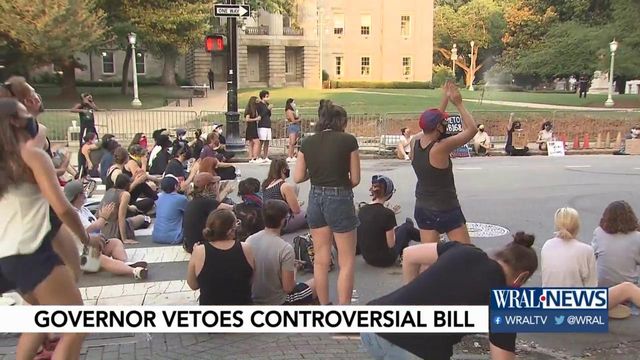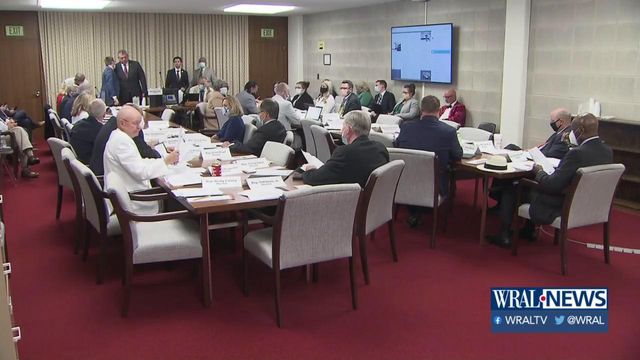Cooper vetoes controversial death records language, wider bill
Facing a midnight deadline and despite signs of a legislative fix, Gov. Roy Cooper vetoed a bill that had protesters camping out in front of the governor's mansion.
Posted — UpdatedThe veto came before a midnight deadline for the governor to act and with a potential legislative fix in the offing that could have excised the problematic language and left the rest of the bill intact – including millions of dollars in it for the state Department of Health and Human Services.
But worries that the House and the Senate might not come through on a promised fix spurred the veto stamp. The next steps are unclear as legislators prepare for a couple of days' worth of lawmaking this week before adjourning again until September.
Senate Bill 168 was a grab bag of health policies and funding measures that the Cooper administration asked for. It passed the legislature nearly unanimously last month, getting its last vote just after 1 a.m. June 26, as lawmakers wrapped up that portion of the session.
"Senate Bill 168 includes a provision to change the handling of public records by the Office of the Chief Medical Examiner, which could have the unintended consequence of limiting transparency in death investigations," Cooper said in his veto message Monday. "While I believe neither the Department of Health and Human Services, which proposed it, nor the General Assembly, which unanimously passed it, had any ill intent, the concerns that have since been raised make it clear this provision should not become law."
House and Senate Republican leaders had already said they were willing to revisit the language, and the House started that process Monday afternoon, advancing a fix-it bill through a key committee. But House leaders also added other things to the bill that took the Cooper administration and Senate leaders by surprise, feeding concerns that the deal might not come together.
The governor's veto, announced some four hours before a constitutional deadline to act on the bill, settles the open records issue but leaves others unclear. Senate Bill 168 included some $25 million in federal grant money for DHHS, plus policy measures the agency requested.
Senate Bill 232, the bill that started moving Monday to fix Senate Bill 168, contains a couple of provisions on masks, including language meant to make it clear that people can keep wearing them throughout the pandemic, despite a North Carolina law that forbids mask wearing.
That law is decades old, seldom enforced and written to address the Ku Klux Klan. The legislature suspended it until Aug. 1, but House-Senate negotiations to extend that suspension broke down around the same time Senate Bill 168 won final passage last month.
House leaders added language to the fix-it bill Monday to extend that suspension indefinitely. Senate leaders said through a spokeswoman that they didn't see the new mask language until it rolled out to the public shortly after 4 p.m. and that they'd need to review it.
That left it unclear whether the Senate would ultimately back the fix-it bill, though House Rules Chairman David Lewis, R-Harnett, and House Majority Leader John Bell, R-Wayne, said Monday they were optimistic.
“Allowing folks the freedom to wear medical face masks in public for the purpose of public health and safety is a common sense policy that I feel confident will be a shared priority when this bill is heard in the Senate," Lewis said in a statement.
House Speaker Tim Moore said Monday that he plans to carry out any veto override attempts Wednesday. He said he hopes votes won't be needed after that, though the House may stay in session until Saturday.
The Senate plans to hold a one-day session Wednesday, according to Senate President Pro Tem Phil Berger's office. Republican leaders will give 24 hours' notice, as required by Senate rules, before holding veto override votes, Berger spokeswoman Lauren Horsch said.
The House also added another rider to the fix-it bill Monday, and it also deals with masks. It says businesses tasked with enforcing the governor's recent order that requires people to wear masks in public can satisfy that responsibility simply by posting a sign saying masks are required.
The North Carolina Retail Merchants Association asked for the language after seeing mask enforcement turn ugly upon occasion in other states.
Related Topics
• Credits
Copyright 2024 by Capitol Broadcasting Company. All rights reserved. This material may not be published, broadcast, rewritten or redistributed.






